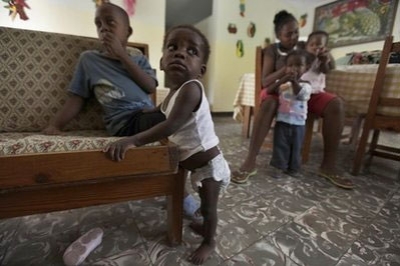We need a more sustainable solution to the global orphan crisis

I understand why people think orphanages effectively address the global orphan crisis. According to UNICEF, there are around 140 million orphans currently in the world. And orphanages can provide a place where children are safe with basic needs met. They have toys, clothing and shelter. They go to school. They sometimes have a swing set.
Orphanages allow loving, well-intentioned people to see the direct results of their donations and their work in a tangible way. But are they what’s really best for children? Decades of research tells us no. It’s time to change how we respond to the Global Orphan Crisis. First, we need to understand that in many ways it’s not an orphan crisis, but an “orphanage” crisis, and in order to usher in real change, we must start to visualize a solution that doesn’t have four sturdy walls:
Families.
Orphanages, however loving and compassionate the staff, founders and surrounding community, are not adequate substitutes for real families. Studies have shown that institutional care – like orphanages - affects the way a child’s brain develops, causing dramatic developmental delays and even stunts physical growth; institutionalized children average 1.0–1.5 standard deviations below the mean for parent-reared children with respect to physical growth and behavioral and mental development. In fact, decades of research have shown us how children’s brains develop differently when affected by abuse and neglect. This changes how children form relationships and limits their ability to attach to others.
Then, there is the logistical issue of a few workers caring for many children. Young children are hardwired to need more than just food and water—they need attention and touch and positive affirmation from a consistent and present role model. Even the most good-hearted orphanage employees cannot possibly fulfill these emotional needs to a large group of children in a truly satisfactory manner. Groups of well-intentioned youth groups and church volunteers can also not meet these needs for children. Everything about growing up in an orphanage has life-altering consequences.
Think about your own family. If something awful were to happen, you wouldn’t want your child would go to an orphanage. Not even one with toys, a school and a swing set.
Parents in the United States often make arrangements for their children to live with relatives should anything unexpected happen, and when that’s not an option, we rely on foster care. By the 1950s, more children lived in foster homes than in orphanages in the United States. Today, U.S. orphanages have largely disappeared with foster care taking their place.
According to UNICEF data, an estimated 90 percent of “orphaned” children around the world actually have at least one living parent. Some parents surrender children to an orphanage because an extenuating circumstance – poverty, illness, regional violence, war or displacement – leads them to that point. If my child is in an orphanage, they think, at least they’ll eat. At least they’ll have a chance to go to school. At least they’ll have a chance at life.
For parents facing desperate options, the orphanage down the road that promises food and education becomes a good option and surrendering that child is the loving choice. They see it as the best option – or, often, their only option – for their child’s survival or education.
Poverty should never be a reason to place a child in an orphanage – orphanages were never made to meet this need. They were once necessary in the midst of large-scale crises, like the HIV/AIDS crisis, that took the lives of entire villages. But now, orphanages should be a last resort, because there is a better way: Family-centered, individualized care.
Foster care that has been contextualized to function effectively in developing countries should be the alternative to orphanages. It’s time to change our understanding of orphanages to reflect the fact that most of the children in them are not actually orphaned. The majority of children in orphanages worldwide have one or two living parents. Family preservation and family strengthening programs, like temporary foster care, should replace orphanages and be offered to help assist parents thrive and remain together with their children.
Christians who feel strongly the biblical call to care for the widow and orphan, and who have led the missions work to build orphanages in the past, are uniquely qualified to lead a movement of change within the Western Church. It is time to stand against orphanage-based care and instead support local, community-based foster care around the world. Foster care was the right decision in the U.S. in the early 1900s and it’s the right decision now on a Global stage.
But the Global effort must foremostly empower the local leaders and social work professionals to lead the change in their own communities. At Bethany, our goal with sharing a foster care blueprint is always to make sure our presence is temporary and that we ultimately are able to step away and let local governments and community-based organizations take the reins. This ensures quality family-based care and support services are sustainable and tailored to every community’s particular needs.
A family setting best supports a child’s spiritual, physical, psychological, social, and emotional needs. I urge Christians, churches and global outreach organizations across the U.S. during this National Foster Care Month to help us in this movement to support families, reunify children in orphanages with their families and establish foster care systems around the world, because every child is made in the image of God, and each of them matters.




























